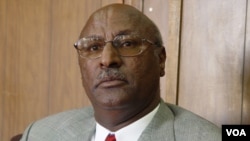This is Part Four of a five-part series on Eritrea Today
Continue to Parts: 1 / 2 / 3 / 4 / 5
Over the past several years, the Horn of Africa has experienced grave drought. Aid agencies say it has been the worst drought to hit the region in decades, and the ensuing famine has forced hundreds of thousands to flee their homes and sometimes cross national borders in search of food.
Eritrea, alone in the region, officially denied any food shortages within its borders and refused food aid.
In a recent interview with VOA, agricultural minister Arefaine Berhe repeated the official denials. He maintained that there was enough food to feed Eritrea's people during the the drought.
“We really don’t have hungry people…because in Eritrea some of the people are involved in the production of crops, some of them are in horticulture, poultry and beekeeping," he said. "All of these, at the end of the day, help them to get their basic food. If that is not possible, we have a responsible government. It makes sure that serious crops and other food stuffs are available on the market, unlike what we see elsewhere,” said Berhe.
“The prices of crops have been steadily decreasing in Eritrea since 2008," he added. "Now the price that you have this year is much less than the price of last year, and the one of last year, is much less than the price of the previous year. So that is not true, we don’t have hungry people in Eritrea, we have a very good coping mechanism.
However, in contrast to government assertions, aid officials and journalists in the region reported thousands of Eritreans had streamed across the border into Ethiopia in search of food. In July 2011, Assistant U.S. Secretary of State Johnnie Carson said many of the refugees from Eritrea were suffering from malnutrition, and he criticized what he called Eritrea's "repressive regime" for failing "to provide data on the humanitarian needs of its own people."
And according to Human Rights Watch, President Isaias Aferwerki in 2009 acknowledged in private to the UN that his country was suffering from famine.
Aid and dependency
Aid workers and diplomats have criticized Eritrea for refusing to provide statistics for the number of its people needing assistance and “arrogantly” refusing any food aid.
But Berhe said one of the government‘s major priorities is to attain food security for its people within the next five years.
The agricultural minister said food aid has never been a solution to any problem, adding that it encourages dependency, brings about misery and worsens the conditions of the targeted population it is intended to help.
“Rejecting food aid is not a question of arrogance. It’s a question of the very clear principle of self-reliance. This is not something that we just introduced. It was there even during the [struggle for independence], we said self-reliance is the best solution,” he said.
Berhe expressed confidence the country will soon be exporting food crops based on what he called pragmatic agricultural schemes the administration has been implementing.
“We are enlightening our farmers on how to prepare the land better and how to use improved seeds," he said. "We are introducing machinery so that we can plow the land and cultivate it better. We are also making sure that our research institutions and our extension schemes address basic farming problems in Eritrea.”
He added, "we are now building the necessary [foundation] for Eritrea to export at least high value crops like vegetables, fruits and flowers and so on. The basic background is being laid,” he said.
Continue to Parts: 1 / 2 / 3 / 4 / 5
Over the past several years, the Horn of Africa has experienced grave drought. Aid agencies say it has been the worst drought to hit the region in decades, and the ensuing famine has forced hundreds of thousands to flee their homes and sometimes cross national borders in search of food.
Eritrea, alone in the region, officially denied any food shortages within its borders and refused food aid.
In a recent interview with VOA, agricultural minister Arefaine Berhe repeated the official denials. He maintained that there was enough food to feed Eritrea's people during the the drought.
“We really don’t have hungry people…because in Eritrea some of the people are involved in the production of crops, some of them are in horticulture, poultry and beekeeping," he said. "All of these, at the end of the day, help them to get their basic food. If that is not possible, we have a responsible government. It makes sure that serious crops and other food stuffs are available on the market, unlike what we see elsewhere,” said Berhe.
“The prices of crops have been steadily decreasing in Eritrea since 2008," he added. "Now the price that you have this year is much less than the price of last year, and the one of last year, is much less than the price of the previous year. So that is not true, we don’t have hungry people in Eritrea, we have a very good coping mechanism.
However, in contrast to government assertions, aid officials and journalists in the region reported thousands of Eritreans had streamed across the border into Ethiopia in search of food. In July 2011, Assistant U.S. Secretary of State Johnnie Carson said many of the refugees from Eritrea were suffering from malnutrition, and he criticized what he called Eritrea's "repressive regime" for failing "to provide data on the humanitarian needs of its own people."
And according to Human Rights Watch, President Isaias Aferwerki in 2009 acknowledged in private to the UN that his country was suffering from famine.
Aid and dependency
Aid workers and diplomats have criticized Eritrea for refusing to provide statistics for the number of its people needing assistance and “arrogantly” refusing any food aid.
But Berhe said one of the government‘s major priorities is to attain food security for its people within the next five years.
The agricultural minister said food aid has never been a solution to any problem, adding that it encourages dependency, brings about misery and worsens the conditions of the targeted population it is intended to help.
“Rejecting food aid is not a question of arrogance. It’s a question of the very clear principle of self-reliance. This is not something that we just introduced. It was there even during the [struggle for independence], we said self-reliance is the best solution,” he said.
Berhe expressed confidence the country will soon be exporting food crops based on what he called pragmatic agricultural schemes the administration has been implementing.
“We are enlightening our farmers on how to prepare the land better and how to use improved seeds," he said. "We are introducing machinery so that we can plow the land and cultivate it better. We are also making sure that our research institutions and our extension schemes address basic farming problems in Eritrea.”
He added, "we are now building the necessary [foundation] for Eritrea to export at least high value crops like vegetables, fruits and flowers and so on. The basic background is being laid,” he said.






